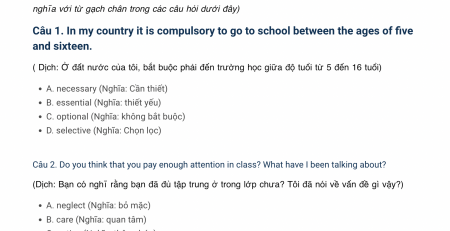Tổng hợp Bài tập từ loại tiếng Anh đầy đủ các dạng

Để ghi nhớ sâu hơn những kiến thức về những từ loại đã học, Patado đã tổng hợp và chia sẻ tới bạn một số bài tập từ loại tiếng Anh có đáp án giúp bạn luyện tập và thực hành.
9 từ loại trong tiếng Anh: Cách sử dụng, dấu hiệu nhận biết và vị trí
A. Bài tập từ loại: Danh từ
I. Choose the right answer.
1. It’s important to brush your … at least twice a day.
A. Tooth b. Teeth
C. Tooths d. Toothes
2. We have a lot of … near our house causing pollution.
A. Factorys B. Factores
C. Factories D. Factoris
3. There are a number of interesting … at my party.
A. People B. Persons
C. Peoples D. Person
4. Have you ever seen the new … in that shop next door?
A. Radioes B. Radies
C. Radioses D. Radios
5. They’ve put some lovely … in the city park.
A. Benchs B. Benchies
C. Benches D. Bench
6. We usually buy three … of bread at the weekend.
A. Loaves B. Loafs
C. Loafes D. Loave

II. Most of the sentences are wrong. Put a tick (V) if the sentence is correct. If it is incorrect, cross the unnecessary or wrong word and write or correct it in the space.
1. I like a classical music very much.
2. The crowd are all enjoying the game.
3. My grandmother wears glass when she reads.
4. We like Martin and Jill. They’re nice persons.
5. The government want to increase taxes.
6. Cattle was driven hundreds of miles.
7. This scissors is not very sharp.
8. That’s a wonderful news!
9. There was a police officer standing at the corner.
10. Leafs turn yellow in the fall.
11. I’m going to buy a new pyjama.
12. There is some luggages in the car.
13. Three pounds are not a big enough tip.
14. I heard an interesting piece of information.
15. Has the police arrived yet?
Đáp án:
I. 1. B 2. C 3. A 4. D 5. C 6. A
II. 3. glass → glasses
4. persons → people
6. was → were
7. is → are
8. a wonderful news → wonderful news
10. leafs → leaves
11. a new pyjama → new pyjamas/ a pair of new pyjamas
12. luggages → luggage
13. are → is
B. Bài tập từ loại: Đại từ
I. Complete the sentences with some/ any/ somebody/ anybody/ something/ anything
1. I was too surprised to say anything.
2. There’s … at the door. ~Are you expecting …?
3. Did you get the oil? ~ No, there wasn’t … left.
4. Why are you looking under the bed? Have you lost …?-Well, I was looking for … but now I can’t remember what it was.
5. Would you like some cheese and biscuits? ~ Oh no, thank you. I couldn’t eat … else.
6. You must be hungry. Would you like … to eat?
7. Quick, let’s go! There’s … coming and I don’t want … to see us.
8. Sally was upset about … and refused to talk to…
9. This machine is very easy to use. … can learn to use it in a very short time.
10. Were there any calls for me? -Yes, … rang while you were out. He refused to give his name, but he wanted to discuss … with you.

II. Choose the right word.
1. She told (nobody/ anybody) about her wedding.
2. (Everyone/ someone) knows the man is a thief, but (anyone/ no one) dares to say
so publicly.
3. I can’t go to the party. I haven’t got (nothing/ anything) to wear.
4. Id like to go away (somewhere/ nowhere) if I can. (Someone/ Anyone) I know has
invited me to his villa in Portugal, so I may go there.
5. What’s in that box? –(Nothing/ Anything). It’s empty.
6. I don’t know (nothing/ anything) about economics.
7. Has Matthew got a job yet? -No, but he’s looked (somewhere/ everywhere). He
hates the idea of sitting around doing (something/ nothing).
Đáp án:
I.
2. somebody- anybody
3. any
4. something- something
5. anything
6. something
7. somebody-anybody
9. anybody
10. somebody-something
II.
1. nobody 6. anything
2. everyone- no one 7. everywhere- nothing
3. anything 8. nobody
4. somewhere- some one 9. something
5. nothing 10. nobody-anything
C. Bài tập từ loại: Tính từ
I. Write the information in a single sentence.
1. This game is new. It’s for the family. And it’s exciting.
→ This is an exciting new family game.
2. This computer is for business. It’s Japanese. And it’s powerful.
3. This fire is electric. It’s excellent. And it’s small.
4. This is a chocolate bar. It’s new. And it’s a big bar.
5. This comedy is American. It’s for television. And it’s terrific.
6. These doors are aluminium. They’re for your garage. And they’re stylish.
7. Those shoes are modern. They’re for sports. And they’re wonderful.
8. This phone is a mobile. It’s German. And it’s very good.

II. Put in each or every
1. There were four books on the table. Each book was a different colour.
2. … guest watched as the President came in.
3. There were cars parked along… side of the street.
4. My father plays tennis … Thursday evening.
5. I understood most of what they said but not … word.
6. … of the six flats has its own entrance.
7. We had a great weekend. I enjoyed … minute of it.
8. The book is divided into five parts and … of these has three sections.
9. Car seat belts save lives. … driver should wear one.
10. … day seemed to pass very slowly.
Đáp án:
I.
2. This is a powerful Japanese business computer.
3. This is an excellent small electric fire.
4. This is a big new chocolate bar.
5. This is a terrific American television comedy.
6. These are stylish aluminium garage doors.
7. Those are wonderful modern sports shoes.
8. This is a very good German mobile phone.
II.
2. every 3. each 4. every 5. each
6. each 7. every 8.each 9. every 10. each
D. Bài tập từ loại : Trạng từ
I. Is the word order right or wrong? Correct the ones that are wrong.
1. Everybody enjoyed the party very much. → Right
2. I go always to work by car. → Wrong: always go
3. Jim doesn’t like very much coffee.
4. He drinks two cups of coffee every evening.
5. I phoned Tom immediately after hearing it.
6. Did you go late to bed last night?
7. Steve gets hardly ever angry.
8. We soon found the solution to the problem.
9. Jane has usually to hurry in the morning.
10. What did you learn today at school?
Thực hành ngay “Tổng hợp bài tập trạng từ tiếng Anh (có đáp án)
Một phần ngữ pháp dễ nhưng cũng hay khiến chúng ta nhầm lẫn chính là cách phân biệt tính từ và trạng từ trong tiếng Anh

II. Complete the conversations using the words in brackets in the correct order.
1. A: Do you know her?
B: Yes. But I can never remember her name. (remember/ never/ can)
2. A: Are you tired?.
B: Yes, I … tired at this time of day (am/ always)
3. A: Where’s Jim?
B: He … home early. (gone/ has/ probably)
4. A: Did you know the man who tried to steal your bag?
B: No, but I … him again. (certainly/ recognize/ would)
5. A: That was goal, wasn’t it?
B: Yes, the ball… the line. (clearly/ crossed)
Đáp án:
I.
3. Wrong : doesn’t like coffee very much
4. Right
5. Wrong : immediately phoned Tom
6. Wrong : go to bed late
7. Wrong : hardly ever gets angry
8. Right
9. Wrong : usually has to hurry
10. Wrong : at school today II.
II.
2. am always
3. has probably gone
4. would certainly recognize
5. clearly crossed
E. Bài tập từ loại: Động từ
I. Complete the sentences with can (not) , could (not) or be (not) able to . Sometimes it’s possible to use either .
1. Natasha could / was be able to play the piano when she was four .
2. George has travelled a lot . He… speak four languages .
3. I used to … to stand on my head but I can’t do it now .
4. I’m afraid I … come to the party tonight .
5. The computer went wrong, but luckily Emma … put it right again .

II. Complete the conversations . Put in a to – infinitive or an ing – form .
1. A : I hear you sometimes sail to France in your boat .
B : That’s right . I really enjoy sailing .
2. A : Are you going to organize our trip ?
B : Yes , of course . I’ve agreed … it.
3. A : You wear a uniform at work , don’t you ?
B : Yes , I have to , although I dislike … it .
4. A : Do you think they’ll approve the plan ?
B : Yes , I’m quite sure they’ll decide … it .
5. A : What time will you be back ?
B : Oh , I expect … back sometime around nine.
Đáp án:
I.
2. Can/is able to
3. be able to
4. can’t/am not able to
5. was able to
II.
2. To organize
3. wearing
4. to approve
5. to be
F. Bài tập từ loại: Cụm động từ
I. Put in a phrasal verb that means the same as the verb in brackets . Use the correct form of the phrasal verb .
Rachel : I’ve (1) ….. (discovered) what the problem is with the exam .
Vicky : Oh , good . Tell me .
Rachel : When they printed the papers , they (2) ….. (omitted) a page . No one no ticed until the papers had all been (3)…… (distributed) . Now they’ll have to (4)……. (discard) all the papers and (5) …… (postpone) the exam .
Vicky : Are you sure you haven’t (6) ….. (invent) this whole story ?
Rachel : It’s true , I tell you . And isn’t it good news ?
Vicky : I don’t know about that . It means we’ll have to (7) …… (continue) revising.

II. Complete the second sentence so that it has a similar meaning to the first . Use the word in brackets .
1. I’m trying to find my diary. (looking)
2. You’re too young to stop working. (give)
3. This bag is Janet’s. (belongs)
4. The police continued to watch the house. (carried)
5. They talked about the plan. (discussed)
Đáp án:
I.
1.found out 2. Left out
3. sent out 4. Throw away
5. put off 6. Made up 7. Go on/ carry on
II.
1. I’m looking for my diary.
2. You’re too young to give up working.
3. This bag belongs to Janet.
4. The police carried on watching the house.
5. They discussed the plan.
F. Bài tập từ loại: Giới từ
I. Complete the description with at , for , during , by , until or in .
The city of London was found by the Romans (1)…. the year 43 AD. (2) ….the next few years it quickly became the main trading center in Britain . (3)….. two hundred years after the Romans left , the city was almost forgotten . Its full importance did not return (4) …..the eleventh century. (5)…… the end of that century, the government of England was based in Westminster and the Tower of London had been started. (6) ….. the Middle Ages London continued to grow, and (7)…… the time of Shakespeare it had become a prosperous capital city with many fine buildings. Unfortunately, most of these buildings were made of wood and (8)……. 1666 they were almost all destroyed by a fire which lasted (9) …….several. This was a great tragedy for the people living there (10)….. that time, but it is true that many of the areas which are most attractive today were planned (11)….. the rebuilding which followed.
II. Fill in the blank space with the the brackets.
1. We have a bakery……the house so I don’t have to walk far. (in, near, on)
2. Is there a cinema …… your house, on the other side of the street? (opposite over, at)
3. There’s a sweetshop ……. my first floor flat. (inside, below, across)
4. There’s a kiosk …. the street. Can’t you see it? (between, below, across)
5. Nancy is wearing a thick jersey …… her shirt. (over, in, at)

Đáp án:
I. 1. In 2. During 3. For 4. Until 5. By/at
II. 1. Near 2. Opposite 3. Below 4. Across 5. Over
G. Bài tập từ loại: Liên từ
I. Rewrite the following sentences , using these word instead of the underlined ones : as soon as, before, since, when, while, until, after.
1. I’ll love you up to the day I die . → I’ll love you until I die.
2. I must get to the post office earlier than it closes.
3. My leg hurts at the time I walk.
4. Mark heard the news on the radio during the time he was driving home.
5. We’re going to tidy up later than everyone.
II. Put in a suitable conjunction: before , when , while, since , as if .
1. I usually have a snack …… going to be .
2. He had a heart attack ……. watching a video.
3. You look ……. you’ve seen the ghost.
4. How many jobs have you had …… leaving school?
5. Have a rest every hour or so…….. driving long distances.
Đáp án:
I.
2 . I must get to the post office before it closes.
3. My leg hurts when I walk.
4. Mark heard the news on the radio while he was driving home.
5. We’re going to tidy up after everyone’s gone.
II. 1. before 2. While 3. as if 4. since 5. when
H. Bài tập từ loại: Mạo từ
I. Complete this story . Put in al an or the .
(1) A man decided to rob (2)….. bank in the town where he lived . He walked into (3) bank and handed (4)…. note to one of (5)…… cashiers. (6) ….cashier read (7)…… note , which told her to give (8) …….man some money. Afraid that he might have (9) …… gun man then walked out of (11) …. building , leaving (12) …… note behind. However, he had no time to spend (13) ……. money because he was arrested (14) …… same day . He had made (15) …… mistake. He had written (16) …… note on (17) ….. back of (18) …… envelope. And on (19)…… other side of (20) ….. envelope was his name and address. This clue was quite enough for (21) ……. detectives on the case.

II. How much do you know about geography ? Put in these names : Andes, Irish Republic, Italy, West Indies, Lake Michigan, River Nile, North, Pennsylvania, Tasmania, United Kingdom. Decide if you need the.
1. Harrisburg is the capital of Pennsylvania .
2. Dublin is in ……..
3. Chicago lies on the shore of ………
4. Sicily is a part of ………
5 . …….. is England , Scotland , Wales and Northern Ireland .
6 . …….. are a mountain range in South America .
7 . ……….. is an island to the south of Australia
8. Jamaica is an island in ………..
9 . ……… flows through Egypt.
10. Manchester is in ………. of England.
Đáp án:
I.
2. a 3. the 4. a 5. the 6. the
7. the 8. the 9. a 10. the 11. the
12. the 13. the 14. the 15. a 16. the
17. the 18. an 19. the 20. the 21. the
II.
2. the Irish Republic 3. Lake Michigan
4. Italy 5. The United Kingdom
6. The Andes 7. Tasmania
8. The West Indies 9. The River Nile
10. the North
Trên đây là một số bài tập có đáp án về chủ đề bài tập từ loại mà Patado cung cấp cho bạn. Hãy cùng chờ đón những bài viết bổ ích tiếp theo của Patado nhé.



